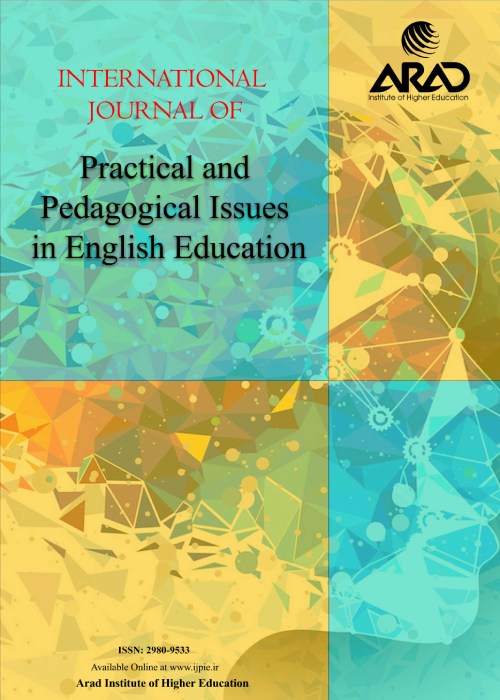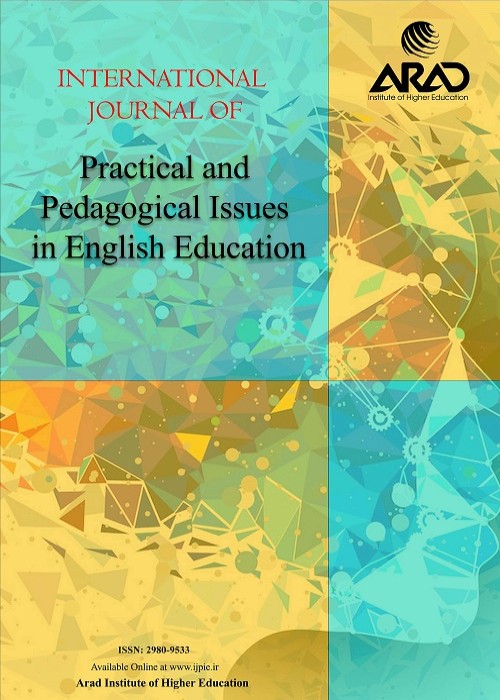فهرست مطالب

Journal of Practical and Pedagogical Issues in English Education
Volume:1 Issue: 3, Sep 2023
- تاریخ انتشار: 1402/07/10
- تعداد عناوین: 6
-
Pages 1-11The current research gathered and compared Iranian instructors' perspectives regarding self-directed language learning in a variety of academic contexts including language institutes, schools and universities. To do the study, 120 EFL teachers with BA, MA, or PhD degrees between the ages of 23 and 54 from Urmia, West Azarbaijan, were chosen to participate in this study. The researcher adopted a teacher questionnaire from the questionnaire used by Borg and Al-Busaidi (2012) and Camilleri (1999). Based on the findings of current study, it was concluded that most of Iranian EFL teachers have positive and favorable attitudes toward self-directed learning and its different constructs. They mostly even in different educational settings positively stated that learners needed to form specific habits such as studying in library, being provided with opportunities for completing tasks alone and moving education to out of classroom. The extent to which teacher in different settings agreed to them was not statistically different. The results of the current study can help teacher trainers to integrate the self-directed learning into their educational curriculum to encourage teachers to use and implement it.Keywords: EFL, self-directed language learning, Perceptions, EFL teachers, academic settings
-
Pages 12-23In the realm of language proficiency assessment, understanding the strategies employed by test-takers can provide valuable insights into the complexities of oral proficiency testing. This study delved into the reported strategic behaviors exhibited by Iranian test-takers when tackling integrated and independent speaking tasks within an English oral proficiency examination, while also scrutinizing the connections between these strategic behaviors and test scores. Each of the 28 participants engaged in one independent task and two integrated tasks, subsequently offering insights into the array and patterns of strategies they employed. The findings indicated that integrated tasks elicited a more extensive repertoire of reported strategies compared to independent tasks. Moreover, the integrated tasks demonstrated greater similarity in terms of reported strategy utilization when contrasted with the independent and integrated tasks. In a broader context, the study revealed that the total number of reported strategic behaviors exhibited no significant correlation with total test scores, irrespective of the task type. While these outcomes underscore the value of incorporating integrated tasks into oral proficiency evaluations, as they stimulate increased reported strategy use when multiple language skills are involved, they also underscore the intricate and varied relationships among task type, task performance, and strategy implementation.Keywords: strategic behaviors, speaking task types
-
Pages 24-39This study concerned with the effect of cooperative and paired-work task-based instructions on EFL learners’ speaking ability and willingness to communicate. To this end, sixty male intermediate learners in a language school participated in the experimental study for 12 sessions. The participants were assigned to cooperative group (N=30) and paired-work group (N=30). After making sure about the homogeneity of the two groups, WTC questionnaire and the PET speaking test were administered to both groups as a pretest. The instructions used in this study were all adapted from Task-based Language Teaching. At the end of the experiment, the same WTC questionnaire and the PET speaking test were again administered as the posttest. Then the researcher compared the results of pre-test and post-test scores to see whether the application of the tasks had affected the learners’ WTC and speaking ability. According to the statistical mean scores gained from pre and post test scores, it was found that not only cooperative and paired-work task-based instructions could both enhance the learners' speaking ability, but also their willingness to communicate was increased. Also, independent samples t-test revealed that cooperative task-based instruction is more effective than paired-work task-based instruction on enhancing Iranian EFL learners' willingness to communicate. Teacher and syllabus designers may benefit from the findings of this study. Teachers can develop group works to remove the learners' reluctance to participate in the speaking activities and syllabus designers can also focus on more motivational communicative tasks to enhance the pupils' chance of participation.Keywords: Cooperative instruction, paired-work instruction, Speaking ability, task based language teaching, willingness to communicate
-
Pages 40-52The concept of linguistics transcends specific languages or communities in today's rapidly evolving world. Bilingualism has become increasingly prevalent in various countries, even in smaller cities. In many nations, the formal language of education differs from students' native tongues, and this distinction can exert both positive and negative influences on students' academic performance. Concurrently, the English language is experiencing a surge in popularity in Iran, with many individuals eager to acquire proficiency in this global language. This comparative survey aims to explore the impact of bilingualism on the dictation scores of second-grade elementary students studying English at the Iran Language Institute (ILI). The study involves 30 bilingual students in Tabriz and 30 monolingual students in Tehran, encompassing both genders. To ensure the comparability of students' educational levels, a preliminary step involved administering the Raven intelligence test. The resulting scores were subjected to ANOVA analysis. Subsequently, a dictation test, consisting of 40 words, was administered to the students, and their scores were subjected to an independent t-test. This dictation test underwent rigorous design and validation processes, which included input from four elementary school teachers. The final findings of the study indicate that there is no statistically significant relationship between bilingualism and dictation scores, nor is there a significant correlation between gender and dictation scores.Keywords: Sociolinguistics, Bilingualism


